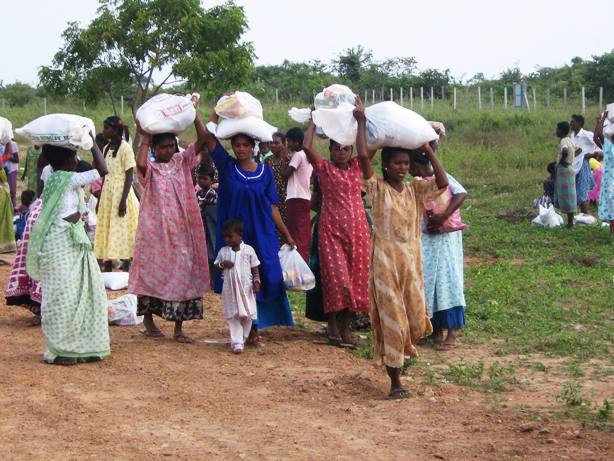The humanitarian situation in Sri Lanka’s embattled eastern province continued to deteriorate this week as hundreds of thousands of displaced Tamils there faced growing shortages of food and shelter.
Displaced by successive Sri Lankan military offensives over the past few months, an estimated 200,000 people are living in squalid conditions without adequate sanitation and security.
International aid organizations and United Nations agencies working with the IDPs in the East have warned of a looming humanitarian crisis and made urgent appeals for international support.
 |
| Refugees collect food handouts for their families. But supplies are runnning out. Photo TamilNet |
As yet, however, there has been no response from the international donor community.
The Common Humanitarian Action Plan for Sri Lanka has only received 33 per cent of its required funding for food aid and has called the latest influx a major humanitarian challenge.
But Sri Lanka Government spokesperson K. Rambukwella dismissed the severity saying only 52,000 are displaced, contradicting his own administration's official figures.
Meanwhile, the government, whilst not providing assistance is forcibly returning refugees to areas considered unsafe against their wishes and the advice of refugee agencies.
"Sri Lankan authorities are using threats and intimidation to force civilians who fled recent fighting in Sri Lanka’s civil war to return home," Human Rights Watch (HRW), a rights watchdog, accused Colombo in a press release issued 16 March.
Just over two weeks ago, a staggering 130,000 people fled their homes in LTTE controlled Vavunatheevu and Karadiyanaru to escape from a renewed Sri Lankan military onslaught on their villages.
They took refuge in already overcrowded refugee camps in Army-controlled territories pushing the total number of IDPs in the Batticaloa district to well over 200,000.
"There is no room for thousands of new war-displaced in crammed refugee camps in Sri Lanka's east, so many are sheltering under trees or in schools and churches," Reuters report, datelined 13 March, said.
Many of the camps are in local schools, preventing the education of ten thousand more Tamil children.
“Because of the new influx of IDPs, 110 schools remain closed in the district. Around 23,000 students from Paduvankarai are not attending schools,” Batticaloa Zonal Director of Education, A. M. E. Paul said.
“Students in 18 other schools face difficulties as they witness the daily trauma of IDPs and fellow students staying in the premises as refugees,” he said.
The World Food Programme (WFP) made an urgent appeal for funds to support its operations, described the need for international assistance as “critical and urgent.”
Meanwhile, accusing the Sri Lankan state of forcibly resettling IDPs to recently captured areas north of Batticaloa town without considering their safety and wishes, the United Nations High Commission for Refugees (UNHCR) has ceased all operations relating to resettlement of refugees.
The UNHCR pull out comes following protests from the UN agency echoed by the international human rights group, Human Rights Watch (HRW), against the government decision to forcefully resettle IDPs in Muttur and Vakarai.
Reports have said of government officials denying aid to refugees who refuse to board buses taking them to their former homes in areas that are still volatile.
On February 15, the WFP Regional Director for Asia Tony Banbury said “unless we receive new funding very soon, we will run out of food supplies by the end of April.”
“After all the suffering endured by the victims of the fighting in Sri Lanka, they should not be hurt further by a lack of international support and concern,” he added.
“We will do everything we can to ensure that all these victims of the conflict – many of them women and children – get the assistance they so desperately need,” he said.
The international community including the co-chairs of peace process, USA, European Union, Japan and Norway have been silent on the continuing military offensive and indifferent to the resulting human suffering.
A delegation of members of Parliament from Tamil National Alliance (TNA) have met foreign ambassadors and sought urgent help.
Thangeswari Kadiraman, TNA MP for Batticaloa said "There are 89 refugee camps, but still, many thousands are living outside with only trees for cover. And the rains are complicating the situation."
However, there has been no international response.
Whilst there has been no response to the international aid agencies’ appeals, neither has there been condemnation of the Sri Lankan counter-insurgency strategy of driving hundreds of thousands of Tamils from their homes by indiscriminate bombardment.
In some districts, WFP has already been forced to put on hold its Mother and Child Nutrition and school feeding programmes in order to re-direct its limited resources towards the newly displaced.
It has also suspended most food-for-work rehabilitation projects in districts ravaged by the 2004 Indian Ocean tsunami.
Following several months of government embargoes on LTTE-controlled areas, WFP said it “urges the Government and the LTTE to guarantee unimpeded access by WFP and other humanitarian organizations to the displaced people.”
